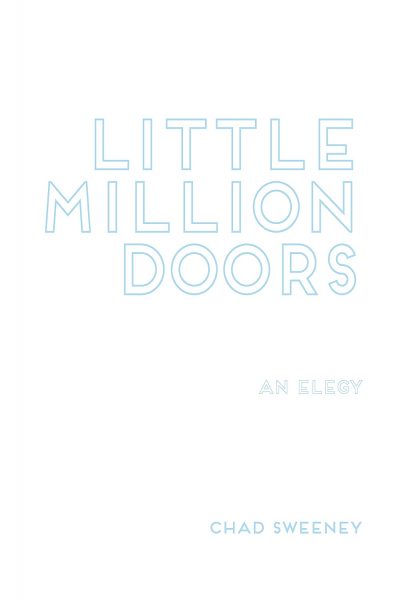
Earlier this month, Publishers Weekly said of Chad Sweeney’s stirring new book, Little Million Doors: “Sweeney masters the art of understatement in this book of forthright and delicate poems…What knowledge we gain, the poet hazards, might be found through absence and negation.” rob mclennan adds, “Meaning becomes, if not fluid, something that shimmers, concurrently in multiple, and even contradictory directions. There is something radiant that emerges from his lines . . . LITTLE MILLION DOORS is a poem grand in scale, composed to the smallest and most immediate moments of grief, thinking and memory.” Here, Sweeney himself reflects on the construction, and perhaps inheritance, of this elegy.
—
When my mother saw my father laid out for his wake, she began screaming and shaking all over, screaming and keening like an animal in no human language but a language of raw trauma, disbelief, and refusal. That’s the language this book is written in. That’s what I felt while writing it, hammered thin and stretched out so thin that I ceased to exist. The world was unbearably beautiful and sad, too far away yet pressed up too close.
I wrote this poem for my father, but somewhere inside the process I had the feeling that he was giving this to me, that he was showing me something—that the poem was his gift to me. This is an elegy for my father and from my father, an elegy for the dead and for living.
I’d like for readers to have their own experience with Little Million Doors—which may include disorientation, bewilderment, crisis, awe, terror or love—so I’m concerned about saying too much which might oversimplify or bring a false sense of clarity. This a liminal space for language and meaning.
I continue to find pathways through this book and to make new discoveries for myself. It’s possible to read this as a vision of afterlife, as a ghost in search of god, self and meaning. It’s also possible to read this as a psychological record of a prolonged autistic meltdown (mine) in the grip of grief, when the senses became unbearably acute, the sounds prismatic, the colors too extreme to bear, the dimensions colliding into one another in a test of the mind’s capacity to witness and to survive. As an autistic person I do feel ghosted or invisible, full of love and curiosity but unable to connect with people, “See me I almost shout/Or I do shout.” The speaker in Little Million Doors may be one voice or many voices. The experience of reading this is more important than its meaning—or perhaps the experience is the meaning.
In this way the form of the poem is not separate from its content. I’ve believed for years that a “sentence” is a unit of cause and effect, which both defines and limits our capacity to think into time, to see along sequences of causality, this causes this causes that. The normative sentence is a track for linear, truncated time. When the sequences of Little Million Doors began to sound in my head, they arrived as fragments of an elastic super-sentence that traced and multiplied and folded, ruptured and reformed, hinged and swayed—to embody a fluid, multifoliate map of time and reality, deep time rippling in all directions: “and watching/Thistle release its down/Where hold and release/Were one word in the small I was/Futuring the thistle to twelve/Distances of/God what is this between us a world.”
There’s always a paradox in using language to reach beyond language, or into the very gap between the word and its thing: “Here language opens at the wound.” A poem only lives for a moment at a time, its mortal body carried delicately inside each reader. I only hope this little book does something for you.
– Chad Sweeney, April 2019
Order your copy of Little Million Doors here!
—
Chad Sweeney is the author of six books of poetry, Little Million Doors (Nightboat Books, winner of
Nightboat Prize, 2019), Parable of Hide and Seek, White Martini of the Apocalypse, Wolf’s Milk (bilingual Spanish/English) Arranging the Blaze and An Architecture, and two books of translation, The Art of Stepping Through Time, the selected poems of Iranian dissident poet, H.E. Sayeh and Pablo Neruda’s final book, Calling on the Destruction of Nixon and the Advancement of the Chilean Revolution (2019). Sweeney’s poems have been included in Best American Poetry, The Pushcart Prize Anthology and Verse Daily. He is the editor of the anthology, Days I Moved Through Ordinary Sounds: Teaching Artists of WritersCorps in Poetry and Prose, and Iroquois elder Maurice Kenny’s posthumous collection of poetry and prose: Monahsetah, Resistance, and Other Markings on Turtle’s Back. Chad Sweeney holds an MFA from San Francisco State University and a PhD from Western Michigan University. He is an Associate Professor of English/Creative Writing at California State University San Bernardino where he edits Ghost Town Lit Mag. He lives in southern California with his partner, Jennifer Kochanek Sweeney, and their two boys.
